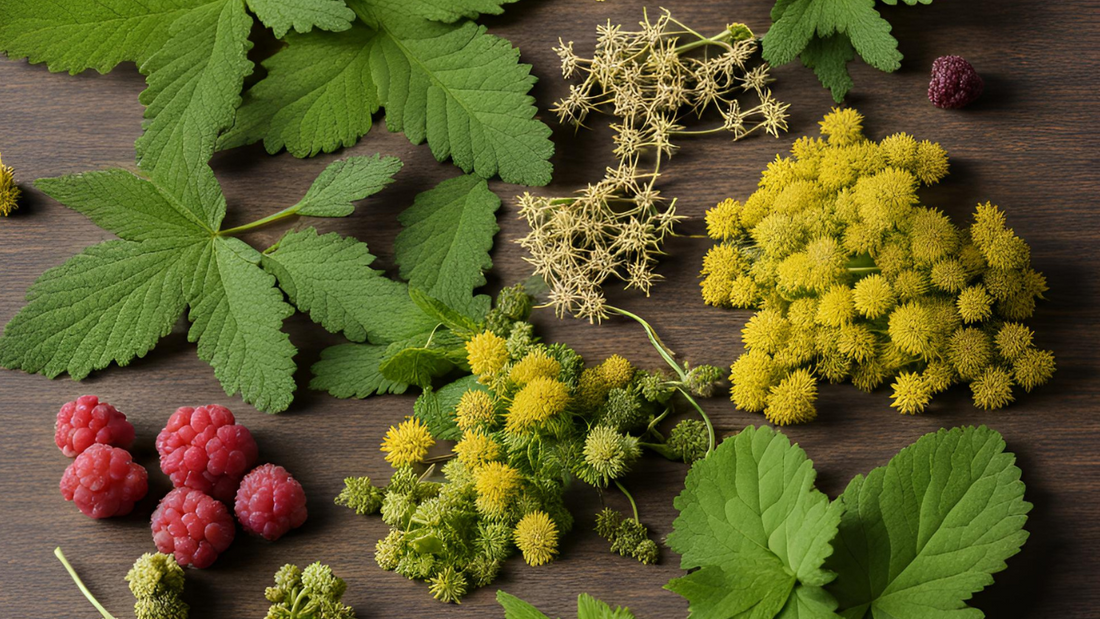Discover Astringent Herbs: Nature’s Support for Wellness

Share
What Are Astringent Herbs?
Astringent herbs are rich in compounds like tannins, which may help tone and firm bodily tissues. Traditionally, these herbs are used to support healthy skin, digestion, and mucous membranes by reducing excess moisture or irritation. Their “astringent action” promotes a sense of balance, making them a staple in herbal wellness.
Unlike FDA-approved treatments, astringent herbs are used to support natural bodily functions, not to cure or treat diseases. Curious about herbal terminology? Explore our guide, “Herbal Actions: A Complete Guide to Using Herbs Effectively (#)” for deeper insights.
The Astringent Taste: A Unique Sensation
Ever sipped strong black tea or bitten into an unripe banana? That dry, puckering sensation is the hallmark of astringency. In traditions like Ayurveda, this taste is valued for balancing excess moisture, such as in cases of puffiness or loose stools. Tannin-rich herbs deliver this distinctive flavor, making them a natural addition to wellness routines.
10 Astringent Herbs and Their Potential Benefits
Below, we share ten astringent herbs traditionally used to support wellness, with insights from scientific studies. Individual results may vary, so consult a healthcare provider before use. We’ve included clear qualifiers to ensure transparency and compliance with FTC guidelines.
Witch Hazel (Hamamelis virginiana)
Known for its tannin content, witch hazel is a skincare favorite. Research suggests it may help reduce minor skin irritation and promote a toned appearance (PMC3909258). It’s often used in toners to refine pores or soothe sensitive skin. Topically, it may provide comfort for minor hemorrhoids.
Note: Effects vary by formulation and skin type. Patch-test before use.
Oak Bark (Quercus spp.)
Oak bark’s tannins make it a traditional choice for oral and digestive health. Studies indicate it may support healthy gums when used as a gargle (PMC7321337). Topically, it may soothe minor skin irritations.
Note: Internal use requires professional supervision due to potential side effects.
Green Tea (Camellia sinensis)
Packed with tannins and antioxidants, green tea may support skin health by reducing oiliness and promoting elasticity (PMC6412948). As a tea, it may aid digestive comfort. Its mild astringency makes it ideal for daily use.
Note: Benefits depend on consumption levels and individual factors.
Blackberry Leaf (Rubus fruticosus)
High in tannins, blackberry leaf is traditionally used to support digestion and oral health. Research suggests it may help maintain healthy digestion during occasional loose stools (PMC6272394). As a gargle, it may soothe throat discomfort.
Note: Consult a doctor for persistent digestive concerns.
Yarrow (Achillea millefolium)
Yarrow’s astringent and anti-inflammatory properties make it a go-to for minor wound care. Studies suggest it may support healing by reducing irritation (PMC3232110). It may also promote digestive balance.
Note: Avoid if allergic to Asteraceae plants.
Calendula (Calendula officinalis)
Calendula’s gentle astringency shines in skincare. Research indicates it may support skin repair and reduce minor inflammation (PMC7321337). It’s safe for sensitive skin, including for infants (e.g., diaper rash).
Note: Patch-test to avoid potential reactions.
Agrimony (Agrimonia eupatoria)
Featured in Zuma Nutrition’s Liver Cleanse & Support Tonic (#), agrimony is traditionally used to support digestion. Studies suggest its tannins may promote healthy gut function. As a tea, it may ease mild throat discomfort.
Disclosure: Zuma Nutrition formulates products to support wellness based on traditional use and research. Results are not guaranteed. Consult a professional before use.
Raspberry Leaf (Rubus idaeus)
Raspberry leaf’s tannins are valued for women’s health, potentially supporting uterine tone and digestion (PMC10383074). It’s also used as a mouthwash for oral comfort.
Note: Pregnant individuals should consult a healthcare provider before use.
Sage (Salvia officinalis)
Sage’s astringent properties support oral hygiene. Research suggests it may soothe minor throat or gum irritation as a rinse (PMC7321337). Sage tea may also help with excessive sweating.Note: Limit internal use to avoid potential toxicity.
Lady’s Mantle (Alchemilla mollis)
Traditionally used for menstrual comfort, lady’s mantle may also support digestion (PMC7321337). Its tannins may promote healthy skin.
Note: Consult a professional for internal use.
How to Use Astringent Herbs Safely
Astringent herbs can be powerful allies when used thoughtfully. Here are tips to ensure safe use:
- Start Small: Begin with low doses or topical applications to test for reactions.
- Seek Guidance: Consult a healthcare provider, especially for internal use, chronic conditions, or pregnancy.
- Choose Quality: Opt for trusted sources like Zuma Nutrition, where products are rigorously tested for safety and purity.
- Stay Informed: Research herbs thoroughly and avoid combining them with medications without professional advice.
Why Choose Zuma Nutrition?
At Zuma Nutrition, we’re committed to providing high-quality, responsibly sourced herbal products to support your wellness goals. Our Liver Cleanse & Support Tonic,, featuring herbs like agrimony, is crafted with care to complement your holistic lifestyle.
